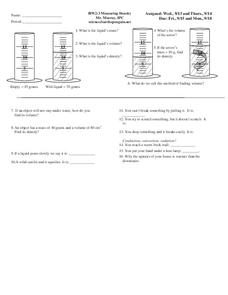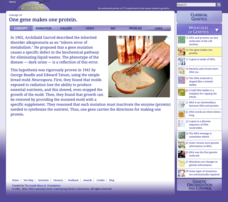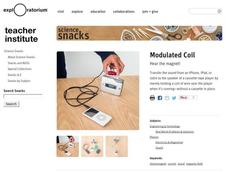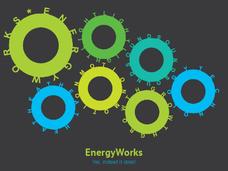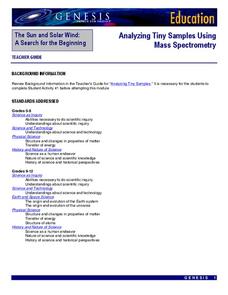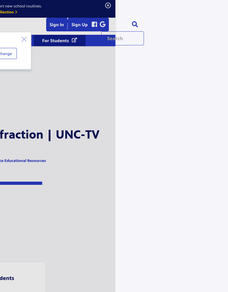Curated OER
Energy from the Sun
In this energy from the sun instructional activity, students are given 20 terms to complete sentences about the sun, the energy of the sun, the radiation of the sun, the transfer of energy from the sun and the currents created by the...
Curated OER
Vocabulary for Weather
In this weather vocabulary worksheet, students define 34 terms related to weather and climate. Terms include instruments used to measure temperature, pressure, wind and humidity as well as types of fronts, conduction, convection and...
Curated OER
Sources of Energy
Learners research various methods for preparing food and analyze energy sources. They explain that radiation, light, and heat are forms of energy used to cook food, treat diseases, and provide energy.
Curated OER
Thermodynamics
In this thermodynamics learning exercise, learners answer 12 questions about energy, conduction, convection and radiation, heat, the conservation of energy and atoms at different temperatures.
Curated OER
Measuring Density
In this density worksheet, students answer 16 questions related to density. They read diagrams of graduated cylinders and determine the liquid's mass, volume and density. They find the density of objects and answer 3 questions about...
Rain Bird Corporation
Rain Forest Teaching Curriculum
Take young naturalists on an exploration of the world's tropical rainforests with this extensive collection of lessons and activities. Whether its creating leaf and flower prints or investigating the absorption spectrum of...
Cold Spring Harbor Laboratory
One Gene Makes One Protein
Very few universities still offer a master's degree in the ecology of grasses, but that was the degree that led George Wells Beadle to an interest in genetics and later a Nobel Prize. Scholars learn about the discoveries of Dr. Beadle...
National Wildlife Federation
Create a Fish
Don't just teach learners to fish, but to create fish. The class discusses fish heads and predicts whether where the fish might live and what it eats. Given an index card with a fish adaptation written on it, pupils construct an...
Beyond Benign
Climate Change Chemistry
Assist your class with learning the importance of caring for our environment as they complete this fun-filled lesson on climate change. Individuals perform simulations related to greenhouse gases, atmospheric gases, and the overall...
Exploratorium
Modulated Coil
Transmit sound with an electromagnet. Class members follow the provided direction and build an electromagnet that will transmit sound though a cassette-tape player. As as extension they create an air core electromagnet and...
Teach Engineering
Flame Test: Red, Green, Blue, Violet?
Let the true colors shine through. Pupils conduct a flame test to identify an unknown element. Class members calculate and prepare specific molarity solutions of three chemicals. Using their observations of the colors emitted, they...
Urbana School District
Thermodynamics
Entropy, it isn't what it used to be. Presentation includes kinetic-molecular theory, heat and internal energy, thermal equilibrium, temperature scales, laws of thermodynamics, entropy, latent heat of fusion, specific heat, calorimetry,...
National Energy Education Development Project
Energy Works: Yes, Indeed it Does!
Moving from its definition to how it moves and its different types, scholars see different examples and then move into its application and use in everyday lives, in an energy-based presentation.
PHET
Alpha Decay
There are different types of radioactive decay, and alpha decay is when there are too many protons in a nucleus. Here is a simulation that shows alpha particles being emitted from a polonium nucleus. Learners see how radioactive decay...
McGraw Hill
Stellar Spectroscopy Interactive
Stars seem to be a far away mystery... but it turns out we know much more about stars than one would think! An engaging lesson shows learners how to read a light spectrum to determine the temperature and chemical makeup of a star....
American Physiological Society
Why is Kettle Corn Cooked in Copper Pots?
The kitchen — it's not just for eating anymore! Specific heat is often a difficult concept to grasp, so give it context by relating it to cooking. Learners gain experience in the principles of thermal energy transfer by designing an...
CK-12 Foundation
Marie Curie's Classroom
What makes some elements stable and others radioactive? Scholars adjust the number of protons and neutrons in an element then observe its decay. The simulation includes a graphical representation and the chemical formula, as well as...
NASA
Analyzing Tiny Samples Using a Search for the Beginning Mass Spectrometry
Teach the basics of mass spectrometry with a hands-on lesson. The fourth in a series of six lessons explores how mass spectrometry measures the ionic composition of an element. Learners then compare and contrast relative abundance and...
K20 LEARN
This Is How the World Ends: Coronal Mass Ejections/Space Storms
Is this the end of the world as we know it? Pupils prepare for a coronal mass ejection during a lesson from the K20 Center. The activity combines video and Internet research in a collaborative assignment that focuses on public safety...
Purdue University
Can You Make an Ultra Violet (UV) Light Detector?
Light the way to a better understanding of UV radiation. After exploring how UV beads work, future engineers design investigations to answer questions about UV radiation. They then create and test prototypes of a device that detects UV...
National Woman's History Museum
Hedy Lamarr, An Inventive Mind
Hedy Lamarr led a double life. Best known as an actress, Lamarr was also a brilliant inventor, responsible for the technology found in Wi-Fi, GPS, and Bluetooth. After studying primary and secondary source materials, groups conduct an...
American Museum of Natural History
Light Quest
Grab a partner and shed some light on light. A remote learning resource has scholars play a board game to answer trivia questions about light. They also read about how Einstein contributed to the understanding of light as both a wave and...
University of Colorado
Using Spectral Data to Explore Saturn and Titan
Saturn is really far away, but knowledge of its composition is within reach. Future astronomers learn how scientists use spectra to remotely determine the chemical composition of a planet or moon. They try out this concept by analyzing...
PBS
Reflection and Refraction | UNC-TV Science
Uncover the exciting interactions of light energy and matter ranging from color to optical illusions. Participants explore color using red and green apples, differences between reflection and refraction, and descriptions of related...
Other popular searches
- Adaptive Radiation
- Electromagnetic Radiation
- Infrared Radiation
- Radiation and Temperature
- Nuclear Radiation
- Sun's Radiation
- Gamma Radiation
- Radiation Budget
- Ceres Radiation Data
- Alpha Radiation
- Radiation and Radioactivity
- Radiation Poisoning






